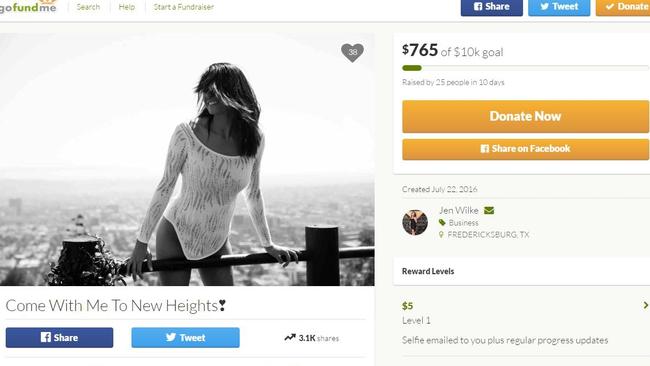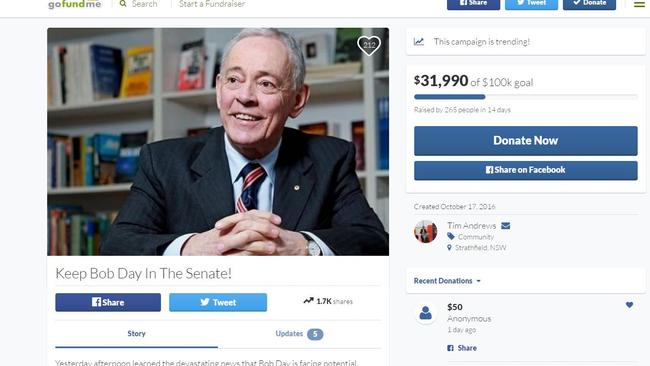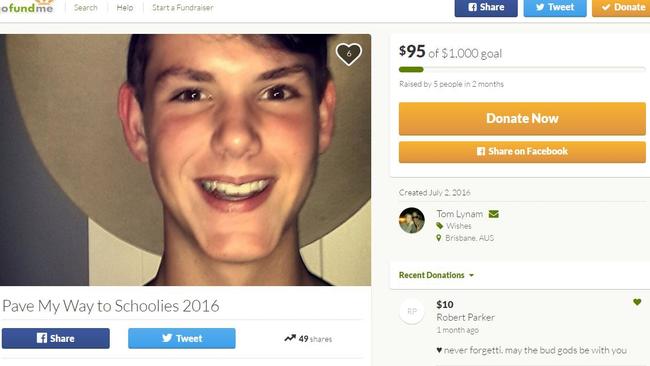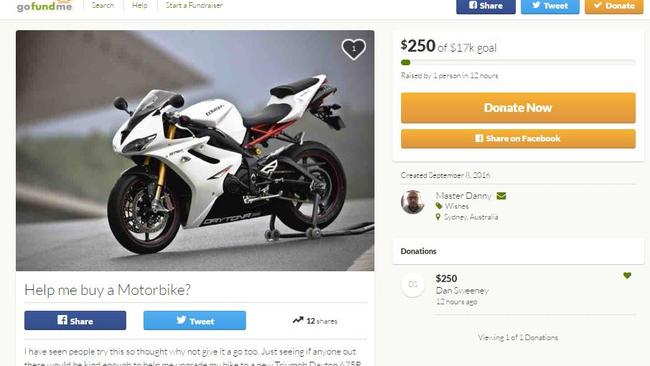Tory Shepherd: Fundraising websites on social media like GoFundMe should be approached with caution
FUNDRAISING websites on social media like GoFundMe should be approached with caution, writes Tory Shepherd.
Opinion
Don't miss out on the headlines from Opinion. Followed categories will be added to My News.
FREE money. Seriously. You just have to ask for it.
There are now a bunch of websites where you can set yourself up as a mendicant. Come up with a project and ask for friends, family or fools to fund it.
GoFundMe is a fundraising site that has been infesting social media lately and claims to have raised more than US$3 billion for “personal causes”. It’s basically a begging bowl.
Just tell a sob story; your puppy needs knee surgery, you really want to go to Tibet, etc., and you can have a site ready to go within minutes. There seem to be plenty of people trying to get the money just to go travelling.
(I set up one begging friends and family to contribute to my retirement fund; so far I’ve raised $5. Considering the site charges 6.75 per cent plus 30c per transaction that won’t even get me a purple rinse.).
These sites are a

quagmire. Projects range from the cool to the quirky to the tear-jerkers to the seriously dodgy.
One group managed to fund the invention of a groovy travel jacket with a built-in neck pillow, eye mask, heaps of pockets — even one for drinks.
On the quirky side, sifting through the various pleas for cold, hard cashola is an education.
Who knew we had a national fistball team? Who even knows what fistball is? Apparently it’s a bit like volleyball.
Anyway, The Possums, the Australian Women’s Fistball team, want to go to the International Women’s World Fistball Championships, so they set up a GoFundMe page to fulfil their dream of “fisting their way to Pomerode, Brazil”.
Tootling around the other imploring sites you’ll also come across one for (recently) former Senator Bob Day. The title of the site is “Keep Bob Day in the Senate!” and so far the founder, Tim Andrews, has raised about $32,000.

He now says that money will go directly to subcontractors left short by the collapse of Mr Day’s firm, Home Australia.
Most of the Australian sites are for people who desperately have to compete in another marathon, sporting event, or creative spasm. One woman wants money to film a music video featuring the lyric “Aussie, Aussie, Aussie, Oi, Oi, Oi”.
Many are set up ostensibly for noble-slash-tragic purposes. To reunite family members or get crucial healthcare. Often for pets.
There’s an odd grey area that is reportedly booming: fundraising sites for funerals. When someone dies and distraught people don’t know what to do with their grief, they’re donating in some cases tens of thousands of dollars to funerals. A critic of GoFundMe says pages are sometimes launched before the body is even cold.

It can be bewildering for a bereaved family, and upset donors might demand to see receipts and accounting techniques the family weren’t prepared for.
Some requests for money are plain fraudulent.
GoFundMe says it is a tiny proportion, but still.
The Courier Mail reported earlier this year that a site was set up claiming a man had pancreatic cancer. He didn’t. He said his friend set it up.
In a case in the US, a five-month-old was waiting for a heart transplant. A family friend reportedly offered to help, and set up a GoFundMe. He then allegedly shut the site, took the money, and spent it on charities — of his choice, not the parents of this sick child.
There are dozens and dozens of other examples.
Be warned: these are not charities; some might be but joining a fundraising site does not make someone a reliable organisation.
There are a couple of caveats, too. At GoFundMe users can withdraw money and put it in their own bank account whenever they like without the displayed total changing. Also, they keep the money even if they never reach their goal of adopting baby sloths or seeing Kilimanjaro rise like Olympus above the Serengeti.
If you’re a soft touch with money to burn, there are endless pits online. It might feel good to be helping a mate get a project up, or a stranger get an operation.
But you can’t always know where your money ends up.

The Australian Charities and Not-for-profits Commission say unless they are registered with the Commission, they are “not being supervised by the charity regulator”.
ACNC assistant commissioner and general counsel Murray Baird tells The Advertiser that you’re just handing someone a “bucket of money”. There are none of the checks and balances that normal businesses and charities have to go through.
Even with the regulator, it’s hard to track where each dollar goes. The ACNC reported in its latest annual report that there is a “high risk of charitable funds being misused for terrorism financing, money laundering, or other non-charitable purposes”.
They investigated about 130 charities to find out how they were using their funds overseas; 10 per cent of those are still being reviewed. There are concerns money given to charity could end up in the hands of terrorists entirely by mistake.
Meanwhile, the Federal Government is more worried about groups getting charitable status for work saving wildlife, tackling climate change, and raising environmental issues.
There’s no doubt the vast majority of fundraisers and donors have nothing but good intentions; but they also need good governance, or you might end up funding Islamic State or a lazy journalist instead of little Jimmy.


